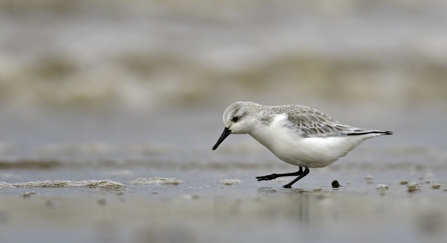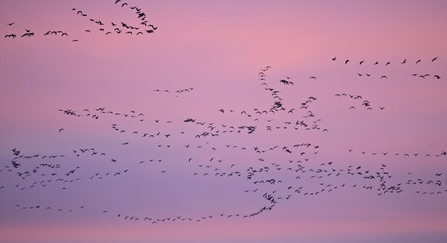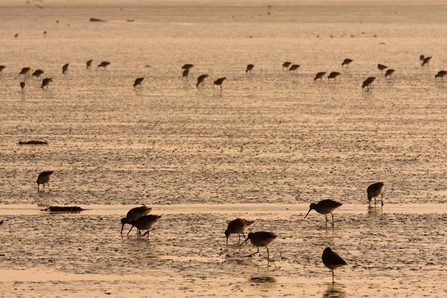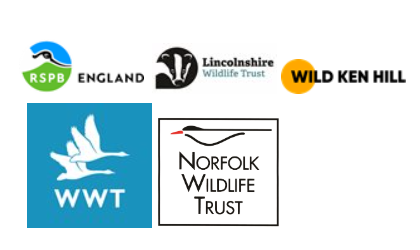James Sutcliffe, CEO of Centre Port Ltd, the company behind the plans for an enormous tidal barrage across the estuary, appeared at a public event called 'The Future of the Wash' in Norfolk this week (Wednesday 10 May).
We attended the event alongside members of the local community, as well as staff from conservation organisations and local businesses including Wildfowl & Wetlands Trust, RSPB and Wild Ken Hill.
Experts from this group of charities and businesses are deeply concerned by the proposed new barrage development which threatens to cause catastrophic damage to one of Europe's most important wetland habitats, turning it into a 'green, fetid lake'.
A tidal barrier on The Wash would release vast quantities of carbon into the atmosphere, exacerbating the impacts of climate change, which directly contradicts the claims of the developer, and could endanger lives by creating increased flood risk.

Sanderling feeding at the tideline of The Wash (credit: Chris Gomersall/2020VISION)
The local fishing industry around Boston and King's Lynn would also be affected by the opening of a new deep-water port. The local economy of The Wash currently supports a thriving fishing and shellfish industry worth an estimated £3.5million per year.
There are also significant concerns that the developer has not asked for the views of or consulted the local community, despite three years of planning.
In a joint statement, we, alongside partners at Lincolnshire Wildlife Trust, Wildfowl & Wetlands Trust, RSPB and Wild Ken Hill are now countering claims made by the developer, Mr Sutcliffe:
The developer's website claims that a core aim of the development is to provide guardianship of the ecology of The Wash and Fenlands, its agriculture and the preservation of the natural habitat in the face of escalating climate change.
Gareth Dalglish, our Nature Recovery Director, says: "The obvious lack of concern for this delicate wild landscape, and its importance on a local, national and global scale for people and wildlife is deeply concerning.
"This scheme would destroy vast swathes of saltmarsh - a crucial habitat supporting wildlife, commercial fish stocks and a vital carbon store that helps combat climate change. And it won't just reduce carbon storage - it will exacerbate the issue due to significant carbon emissions linked to the development and management of the barrage and its associated infrastructure.

Pink-footed geese flying over The Wash at dawn (credit: David Tipling/2020VISION)
"The sediments which accumulate in The Wash store 11,000 tonnes of carbon every year; if a barrage is built, this sediment supply into The Wash from the North Sea will be stopped. There are far better ways to deal with climate change and the threat of sea level rise affecting communities than trashing the environment with a huge development."
Mr Sutcliffe claims that the development would protect local communities from the risk of flooding.
Steve Rowland, RSPB Area Manager, says: “A tidal barrage would impede the flow of water from the five rivers that drain into The Wash and the tides that cover it every day. In doing so the development would destroy our most important site for wildlife in England and introduce potentially life-threatening flood risks to communities living upstream of the many rivers that currently flow into The Wash and along the coastline."
Mr Sutcliffe claims that the development would create a new 'west facing beach' for local communities and visitors to enjoy.
Tim Jickells, emeritus professor at University of East Anglia and retired Oceanographer, says: "A tidal barrage will result in The Wash being filled with river water that is very high in phosphates and nitrates, turning it into a green, fetid lake.”

Black tailed godwit on The Wash (credit: Dave Kilbey)
During last night’s event, the claims Mr Sutcliffe had made about his engagement with local people and organisations were disputed.
A representative of the King's Lynn Conservancy Board, which runs the port, asked why they haven't been offered meaningful engagement from Mr Sutcliffe.
Mr Sutcliffe referenced the fact that he had met with Lincolnshire Wildlife Trust and allayed concerns they have regarding the development. However, Tammy Smalley, Head of Conservation for Lincolnshire Wildlife Trust, said: "The developer's representative has been told clearly that we are not supportive of this development. The representative of the development met with me in person, after which he was very clearly told that nothing he said had changed our position, and that we would continue to oppose the scheme."
Dominic Buscall of Wild Ken Hill, a farm and tourism business found on the edge of The Wash, spoke at the event, and said: "As I made clear in my presentation at the event, this idea is highly likely to be catastrophic for The Wash, its wildlife, economy, local people and landscapes.
"While we must be open-minded about how we adapt to climate change, Centre Port's baseless claims must be met with scrutiny and concern, and that is why Mr Sutcliffe should be challenged at every turn."
The importance of The Wash is recognised in national and international environmental designations including Site of Special Scientific Interest (SSSI), Special Area of Conservation (SAC) and Special Protection Area (SPA). The area has also recently been added to a list of areas in consideration for UNESCO World Heritage Site status.

Logos for RSPB, Lincolnshire Wildlife Trust, Wild Ken Hill, WWT and Norfolk Wildlife Trust
